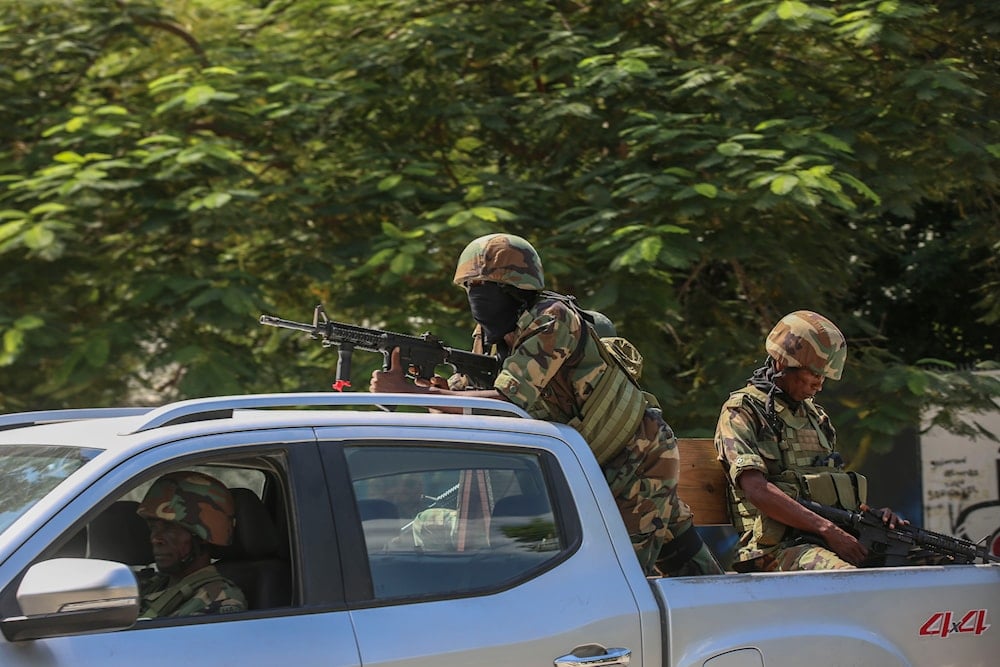Violence still rising in Haiti despite support mission: UN
A senior UN official stresses that Haitians continue to suffer across the country as criminal gang activities escalate and expand beyond the capital, Port-au-Prince.
-

Soldiers patrol amid the sound of gunshots heard in the distance, in Port-au-Prince, Haiti, on October 17, 2024. (AP)
A senior United Nations official stated on Tuesday that gang violence in Haiti is on the rise, even with a multinational force deployed to support the country's struggling police.
"The security situation remains extremely fragile, with renewed peaks of acute violence," Maria Isabel Salvador, the UN secretary-general's special representative to Haiti, told the Security Council. Her update follows a recent gang attack in the central town of Port Sonde that left 115 civilians dead and many others injured.
Salvador referenced the "horrific and brutal" incident, along with a series of other attacks in the capital, Port-au-Prince. She also highlighted the unprecedented levels of sexual violence against women and girls. With over 700,000 internally displaced individuals—a 22 percent rise in just the past three months—she stated that "the humanitarian situation is even more dire."
"Haitians continue to suffer across the country as criminal gang activities escalate and expand beyond Port-au-Prince, spreading terror and fear, overwhelming the national security apparatus," she said.
She expressed worry about Haiti's political process, noting that "despite initial advances reported in July, it now faces significant challenges, turning hope into deep concern." This violence persists even with the UN-backed multinational mission, which began supporting the overwhelmed Haitian police this summer.
UN chief expresses concern over armed children
In a recent report, UN chief Antonio Guterres stated that Haitian police, with the assistance of the Kenya-led mission, have "initiated large-scale anti-gang operations" in various districts of the capital. However, they are struggling to maintain control in these areas due to insufficient personnel and resources.
The mission, which recently had its mandate extended by one year, currently comprises about 430 police and military personnel, primarily from Kenya. An additional 600 Kenyans are expected to arrive soon, but Salvador lamented that the mission remains "cruelly" underfunded and undersupplied.
Additionally, the UN is especially worried about children, who constitute half of the displaced population and are vulnerable to gang exploitation.
UNICEF chief Catherine Russell estimated that children account for 30 to 50 percent of armed group members. "They are used as informants, cooks, sex slaves, and forced to commit armed violence themselves," Russell said.
Guterres expressed concern that children involved with gangs are at risk of mob justice. He shared the tragic case of a 10-year-old boy who was shot and burned by a vigilante group in Port-au-Prince in July after being accused of being a gang informant.
Two killed, 5,000 flee Port-au-Prince
On Monday, at least two women, one of whom was eight months pregnant, were killed, and 5,000 people were displaced as gangs launched attacks on neighborhoods in Haiti's capital, the Civil Protection Agency.
Haiti has endured ongoing gang violence, but fighting has intensified recently, deepening the country's humanitarian, security, and political issues.
A partial report by AFP indicated that the two women were killed in assaults by various gangs associated with the Viv Ansanm ("Living Together") coalition in the southern Solino district. "They were killed inside their homes," said the Civil Protection report, which also described burned houses and vehicles.
Earlier in October, a gang assault on Pont-Sonde resulted in at least 109 fatalities and over 40 injuries. Gangs also attacked a school in L'Estere, which led to the death of a parent and injuries to several children. Meanwhile, powerful gangs control 80 percent of Port-au-Prince and the major roads in the country.
According to the UN High Commissioner for Human Rights, at least 3,661 people have been killed in Haiti since January, as reported at the end of September.
On the other hand, according to a report from Human Rights Watch (HRW), Haitian armed gangs are enlisting starving children to strengthen their ranks in preparation for a prolonged and violent clash with international security forces.
The rights organization stated that the armed groups, which dominate much of Haiti, are luring hundreds, if not thousands, of impoverished children to join their ranks with promises of food and shelter. HRW reports that as many as 30% of Haitian gang members are now children who have been coerced into illegal activities, serving as armed soldiers, spies, or being exploited for sexual purposes.

 4 Min Read
4 Min Read








